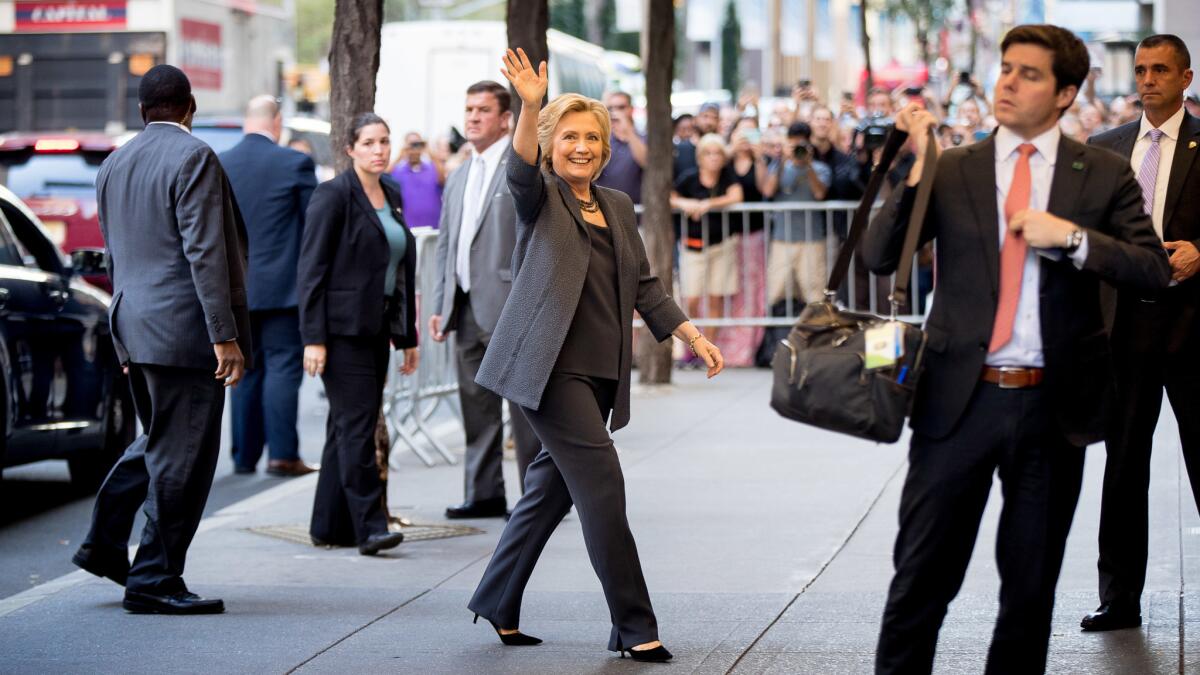Column: Democrats should worry, not panic

In 2008, when Hillary Clinton first ran for the Democratic presidential nomination against Barack Obama, I asked one of her oldest allies how she could be losing a race that appeared to be hers to win.
“I’ve known Hillary for many years, ever since she came to Arkansas,” former Sen. Dale Bumpers told me. “She’ll find a way to screw it up. She always does.”
Eight years later, the conventional wisdom is that Clinton is a much better candidate. She learned hard lessons from her failure in 2008; her campaign this year is smarter and less chaotic. And she isn’t running against Obama, a once-in-a-century political talent; she’s running against an ill-disciplined rookie, Donald Trump.
And yet, as Clinton’s poll numbers have sagged, Democrats have started freaking out: What if the Clinton of 2016 is just as error-prone as the Clinton of 2008?
“I don’t see how Trump can win this election,” a Democratic strategist told me last week. “But I can see a lot of ways Hillary can lose.” (He pleaded for anonymity to avoid becoming persona non grata in Clintonworld.)
Others have piled on with less reticence.
Antibiotics can take care of pneumonia. What’s the cure for an unhealthy penchant for privacy that repeatedly creates unnecessary problems?
— Former Obama adviser David Axelrod earlier this week on Twitter
“Antibiotics can take care of pneumonia,” former Obama adviser David Axelrod wrote, referring to Clinton’s brief health crisis. “What’s the cure for an unhealthy penchant for privacy that repeatedly creates unnecessary problems?”
But while Democrats are right to be worried, they’re wrong to be panicked. This presidential race was always going to be close. Clinton is still in the lead, even if her margin has narrowed.
Last week, the average of national polls compiled by the RealClearPolitics website showed Clinton winning 46% of the popular vote to 44% for Trump.
If Democrats and Republicans behave as they do in most campaigns, they’ll stick with their respective parties’ candidates by massive margins — and the outcome should be a close win for Clinton.
In truth, the polls are doing exactly what campaign strategists on both sides expected: narrowing as Election Day nears.
Clinton won a “bounce” from a successful Democratic convention in July; in August, that average of national polls stood at 48%-40%.
Now, more than a month later, the margin has returned roughly to where it stood before the two conventions.
Besides, Mark Mellman, a Democratic pollster who isn’t working for Clinton, noted that the “fundamentals” of this year’s election — a sluggish economy, a party seeking its third term in office – always made it an uphill climb for Clinton.
“Were it not for Donald Trump, this was set up as a good year for Republicans,” he said.
I don’t mean to suggest that Clinton hasn’t screwed up. She has. In the short term, Clinton’s missteps — her speech calling half of Trump’s supporters “deplorables,” her decision to keep her pneumonia secret until after she appeared to collapse — probably contributed to her swoon in the polls.
But she has also announced a strategy to reboot her campaign: a shift to positive themes instead of negatives about Trump. That shouldn’t sound like an innovation — but this year, it is.
Meanwhile, Trump seems to have heard much the same advice from his new campaign advisors — and has improved, too. He’s given a series of policy speeches on topics from the economy to child care, a stark contrast to the freewheeling Trump who won his primary campaign mostly by belittling rivals.
A major test will come in the candidates’ first debate on Sept. 26. In theory, Clinton should have the advantage. She knows more about policy than Trump, to put it mildly. She has more experience talking about how she would actually govern. She’s less likely to resort to name-calling. The test for Trump, remaining within the chalklines his advisors have sketched out, looks tougher.
Clinton has other advantages in the campaign’s final stage. She has more high-level surrogates to argue her case, from Obama and Bill Clinton to Bernie Sanders and Elizabeth Warren; Trump’s wingmen, Rudy Giuliani and Chris Christie, don’t compare. She has a larger and more professional campaign organization to make sure Democratic voters get to the polls.
“The biggest challenge she’s going to have is turnout,” David Plouffe, Obama’s former campaign manager, said last week. “I think they’ll get there.”
“To win he’s got to get historic republican turnout, get historically bad democratic turnout, and win the center,” he added. “I don’t see any evidence of that.”
My bet is that Plouffe is right, and that Clinton is going to prove Dale Bumpers wrong. She’s a better candidate now; she’s still likely to win. But she’s also going to keep Democrats fighting off panic attacks for the next seven weeks — right up until Election Day.
Twitter: @DoyleMcManus
Follow the Opinion section on Twitter @latimesopinion and Facebook
More to Read
A cure for the common opinion
Get thought-provoking perspectives with our weekly newsletter.
You may occasionally receive promotional content from the Los Angeles Times.











